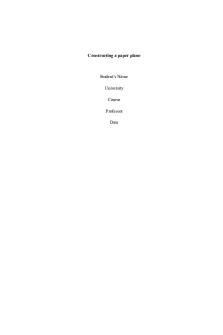C6 Constructing Hypothesis PDF

| Title | C6 Constructing Hypothesis |
|---|---|
| Author | Stoic MH |
| Course | Research Methodology |
| Institution | Royal University of Phnom Penh |
| Pages | 1 |
| File Size | 41.1 KB |
| File Type | |
| Total Downloads | 74 |
| Total Views | 144 |
Summary
Research Methodology: A Step-by-Step Guide for Beginners...
Description
Chapter 6: Constructing Hypothesis 1. What is a Hypothesis? Hypothesis is an assumption that is made on the basis of some evidences, and composes of variables, population and the relation between the variables. 2. Types: i. Null hypothesis: Provides the statement which is contrary to the hypothesis. ii. Simple hypothesis: Shows a relationship between one dependent variable and a single independent variable. iii. Complex hypothesis: Shows the relationship between two or more dependent variables and two or more independent variables. iv. Directional hypothesis: Shows how a researcher is intellectual and committed to a particular outcome. v. Non-directional hypothesis: Use when there is no theory involved. vi. Associative and casual hypothesis: Use when there is a change in one variable resulting in a change in the other variable. 3. Characteristics: i. Simple, specific and conceptually clear ii. Capable of verification: Methods and techniques must be available for data collection and analysis. iii. Relates to the existing body of knowledge iv. Operationalizable: Can be expressed in terms that can be measured. 4. Fuctions: i. Indicates what to find out with the required information only. ii. Improves the validity of the study by making sure that what is set for measurement is really measured. iii. Provide a focused construction of the hypothesis to improve the objectivity of the study. iv. Hypothesis testing helps to make concrete conclusions about what is true and what is false, and to contribute to the formulation of the theory. 5. The testing of a hypothesis: Three phases: i. Constructing the hypothesis. ii. Gathering appropriate evidence. iii. Analysing evidence to draw conclusions as to the validity of the hypothesis. 6. Errors in testing a hypothesis: i. Type I: Rejection of a null hypothesis when it is true. ii. Type II: Acceptance of a null hypothesis when it is false....
Similar Free PDFs

C6 Constructing Hypothesis
- 1 Pages

Constructing Local Theologies
- 6 Pages

C6 - Physiopathologie diarhée
- 4 Pages

C6 intro éco
- 4 Pages

Organizational hypothesis
- 2 Pages

Input Hypothesis
- 10 Pages

Constructing The OIS Curve
- 4 Pages

Contoh soal C1-C6
- 13 Pages

BM - C6 - Chapter 6
- 18 Pages

Constructing the Integers
- 15 Pages

Constructing A Binary Calculator
- 10 Pages

Constructing a paper plane
- 4 Pages

Constructing an Argument UA
- 3 Pages

Hypothesis Testing
- 3 Pages
Popular Institutions
- Tinajero National High School - Annex
- Politeknik Caltex Riau
- Yokohama City University
- SGT University
- University of Al-Qadisiyah
- Divine Word College of Vigan
- Techniek College Rotterdam
- Universidade de Santiago
- Universiti Teknologi MARA Cawangan Johor Kampus Pasir Gudang
- Poltekkes Kemenkes Yogyakarta
- Baguio City National High School
- Colegio san marcos
- preparatoria uno
- Centro de Bachillerato Tecnológico Industrial y de Servicios No. 107
- Dalian Maritime University
- Quang Trung Secondary School
- Colegio Tecnológico en Informática
- Corporación Regional de Educación Superior
- Grupo CEDVA
- Dar Al Uloom University
- Centro de Estudios Preuniversitarios de la Universidad Nacional de Ingeniería
- 上智大学
- Aakash International School, Nuna Majara
- San Felipe Neri Catholic School
- Kang Chiao International School - New Taipei City
- Misamis Occidental National High School
- Institución Educativa Escuela Normal Juan Ladrilleros
- Kolehiyo ng Pantukan
- Batanes State College
- Instituto Continental
- Sekolah Menengah Kejuruan Kesehatan Kaltara (Tarakan)
- Colegio de La Inmaculada Concepcion - Cebu

